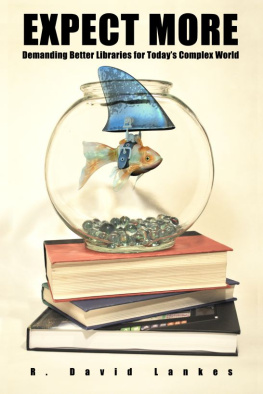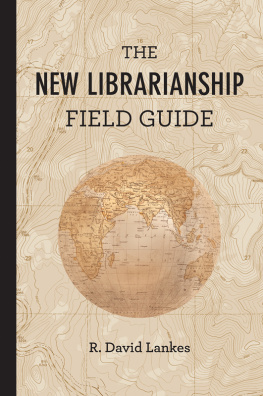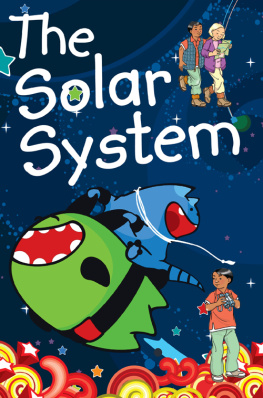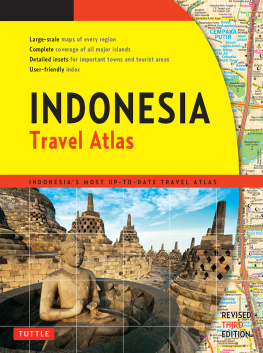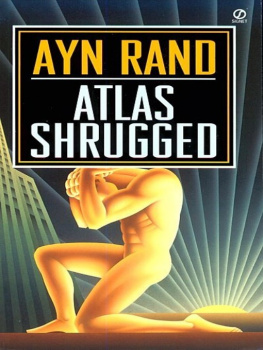Expect More
Demanding Better Libraries For Today'sComplex World
R. David Lankes
Expect More: Demanding Better Libraries ForToday's Complex World
Copyright 2012 by R. David Lankes. All rightsreserved.
Smashwords Edition
For more on the book, to join theconversation, or for volume discounts visithttp://www.riland.org.
This book is dedicated to my wife Anna Maria. Youhave been patient as I have written, traveled, and struggled. Youhave been rightly impatient when I have ignored things that weremuch more important, like the boys, you, and enjoying life. Throughall things you have shown the most amazing ability to tether me toreality and inspire me to reach for the stars.
Acknowledgements
Dean Liz Liddy and Syracuse UniversitysSchool of Information Studies.
Cindy Hlywa for being the first reader of avery early draft.
Amy Behr for research and editingassistance.
Thanks to my editorial crew: Mia Breitkopf,copyeditor and fact-checker; Chelsea Neary, indexer; Loranne Nasirand Emma Montgomery draft editors.
Lauren Britton for working with my kids onthe MakerBot.
Sue Considine and the Fayetteville FreeLibrary for their inspiration and support. Sue, you run a hell of ashop!
The librarians of the Jamesville-DewittCentral School District for their excellent service andresearch.
Beta Testers (early readers and reactors)
Victoria Williams
Dori Farah
Janice Dowling
Marcia Hayden-Horan
Nicolette Sosulski
Lauren Britton
Sue Considine
Kathryn Deiss
Elizabeth Stephens
William Schickling
Marguerite Avery
Sue Corieri
Karen Steinberg
Table of Contents
A Special Note for Librarians
Collective Buying Agent
Economic Stimulus
Center of Learning
Safety Net
Steward of Cultural Heritage
Cradle of Democracy
Symbol of Community Aspirations
I Love ReadingNo Really
Mission to Nowhere?
A Mission Based on Higher Expectations
Library as Facilitator
What is Knowledge?
Expanding the Definition of Facilitation
Teacher, Librarian, Tinker, Spy
Expecting More Than Pie and Prostitutes
Of the Community
Walled Gardens
Grand Challenges
Is My Library that Grand?
Library as Platform
Libraries as Place
Librarian by Hire
Librarian by Degree
Librarian by Spirit
Salzburg and a Few of My Favorite Things
The Facilitators
Adding Up a Librarian
Action Plan for Great Libraries
Action Plan for Bad Libraries
Action Plan for Good Libraries
Introduction
I believe that great librarianship, the kindyou should expect, crosses boundaries. Great librarianship is greatwhether it is in academia, or the public sphere, or K12 schools.For that reason, this book is not about expecting more from publiclibraries or from school libraries, but from all libraries. Schoollibraries have a lot to teach all good libraries about issues ofassessment and learning. Public libraries have a lot to share aboutworking with a wide range of demographics. Academic librariesunderstand the power of knowledge creation. Corporate libraries,and the ever-present bottom line, can teach us all about measuringimpact.
Throughout this book I will use the wordcommunities a lot. I mean this term in a very broad sense. While Iwill talk more about this in Chapter 6, the bottom line is that acommunity is a set of people who come together around acommonality. Communities form where people live, and where theystudy or work. A university is a community, as is a law practice,as is a hospital.
My goal in this book is to show you thepotential of libraries. That potential will never be realized iflibraries or their communities build up rigid boundaries. You canuse what works in little libraries to inform your big library.Ideas that start in public libraries can be successfully used inacademia or businesses.
Where I can, I have tried to includeexamples from multiple types of libraries. However, realize thatthis is more about building bridges than erecting walls. You shouldexpect your library and your community to look across allcategories of libraries for what works, and not be so rigid aboutwhat they choose to consider peer institutions. Innovation comesfrom everywhere and it is up to us to fit that innovation to ourworld.
A Special Note for Librarians
This book is for you to use when workingwith your communities. The main ideas are explored in much greaterdepth and in a more librarian-centric way in The Atlas of NewLibrarianship. Ifyou would like to promote or build on concepts you find here (orare looking for more reasons to disagree) I recommend reading theAtlas.
1. The Arab Spring: Expectthe Exceptional
The Arab Spring had come to Egypt. In early2011, on the heels of a successful revolution in Tunisia, Egyptianstook to the streets to demand reforms from a government regime thathad been in power for nearly 30 years. While much of the mediafixated on protestors who occupied Tahrir Square in the Egyptiancapital of Cairo, many protests started in the port city ofAlexandria. In Alexandria, as in Cairo, people from acrossgenerations and the socio-economic scale rioted to demand liberty,justice, and social equity. In an attempt to restore theconstitution, what was seen primarily as a peaceful uprising leadto the deaths of at least 846 people, and an additional 6,000injured across Egypt. On January 28at 6 pm, after the prisons had opened, releasing murderers andrapists onto the street, all security withdrew from the streets ofAlexandria. Roving gangs of looters took to the streets to takeadvantage of the chaos.
In Egypts port city, the violence andlooting devastated government buildings. Where offices once stood,only burned-out rubble remained. Protestors went from building tobuilding pulling down the symbols of corrupt power. Some lootersand protestors then began to eye the Library of Alexandria.
President Mubarak, the focus of theuprising, had opened the modern library in 2002 at a cost of about$220 million. According to the librarys website, Mubarak built itto recapture the spirit of openness and scholarship of theoriginal, the famous ancient Libraryof Alexandriaone of the wonders of the ancient world.
As it became apparent that the library mightbe in danger, protestors joined hands and surrounded the Library ofAlexandria. Their goal was not to attack it or raid it, but toprotect it. Throughout the protests and looting, theprotestorswomen, men and childrenstood firm and protected thelibrary. In essence, they were retaking the library for the people.After the uprising had subsided, when President Mubarak had steppeddown and the protestors were celebrating their victory around thecountry, not a window of the library had been broken, not a rockthrown against its walls. Why, in the midst of tearing down theregime, did the people of the nation protect the library?
Why?
Why are stories like this, while maybe notquite so dramatic, repeated across the U.K. and the United States?As cities faced with a devastating financial crisis sought to closelibrary branches, citizens rallied. Protestors disrupted town hallsand city council meetings. Citizens picketed, and in Philadelphia,the City Council went so far as to sue the Mayor over the closingof libraries.
In Kenya, the government is building publiclibraries throughout the country, in rural and urban areas alike.Where the communities are too remote, they have built bookcarts5,000 books in a wooden cart pulled by donkeys. In the evenmore remote northern sections of the country, they strap carts andtents to camels. Inside the villages, the carts are opened and thetents erected to allow parents and children an opportunity tolearn. In these villages, camels provide transportation, labor,milk, and meat; even their dung is dried to power stoves. Now thisessential animal is seen as providing another critical service:bringing knowledge to the people.

